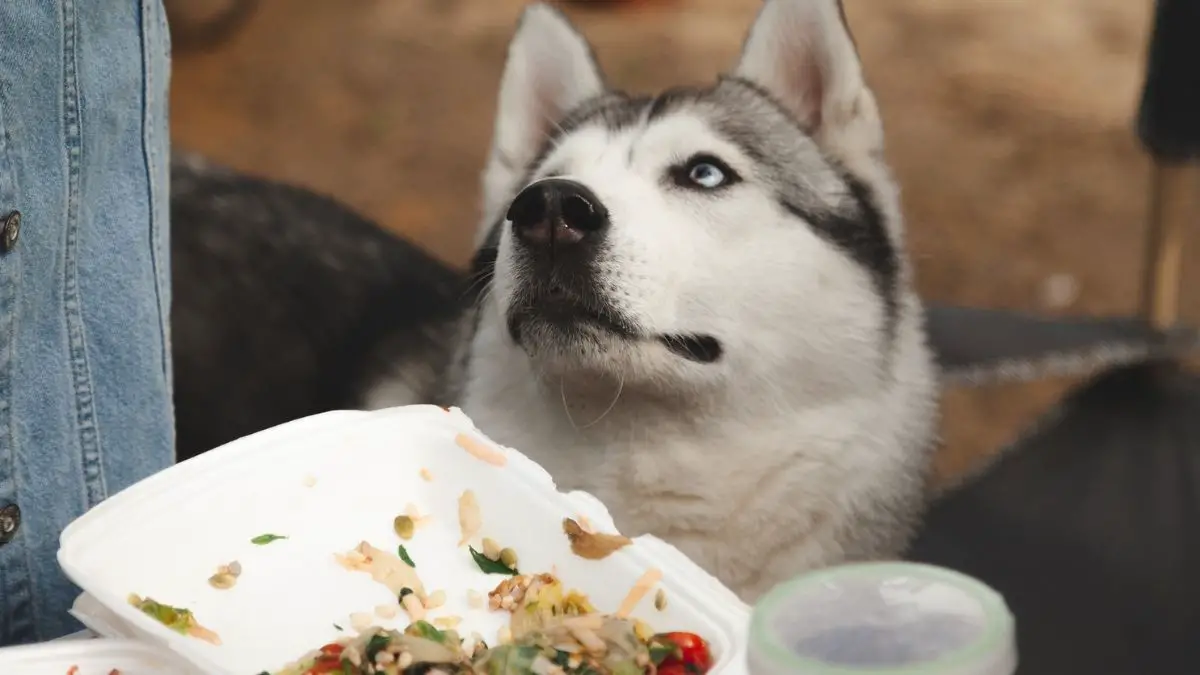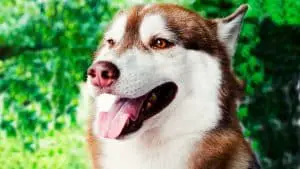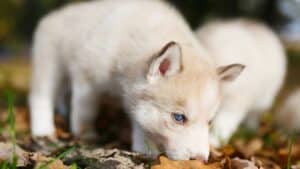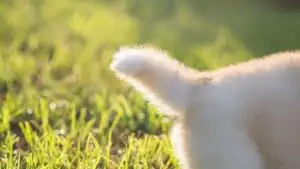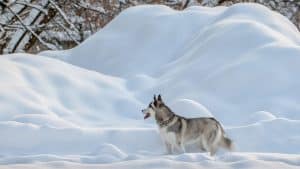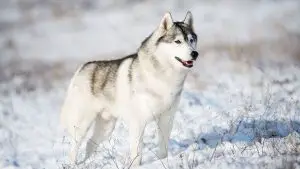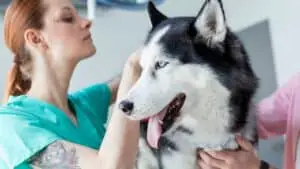My Husky Won’t Eat: Things You Should Know
Huskies have a reputation of not eating much, which causes a common worry to elicit in owners. So why isn’t my Husky eating?
Siberian Huskies do not eat more than they need, depending on the amount of exercise they get. Food isn’t a priority for them, and it’s natural for owners to think that their Husky isn’t eating enough.
Huskies are not possessive animals and don’t get aggressive when you approach them during their mealtime. They only eat as much as they need, unlike other dogs, who, if given the opportunity, won’t stop eating until they lick the plate clean or faint.
However, if you still find it problematic, you’ll find all your answers to why your Husky won’t eat in this article. You will also find insights into how long a Husky can go without eating and tricks to get around this problem.
Table of Contents
How Long Can A Husky Go Without Eating?
The Siberian Husky’s ancestors living in Siberia with the Chukchi people were allowed to roam free to fend for themselves. Thus, a healthy adult Husky can technically go for about 5-7 days without eating (they must be hydrated).
Consult a veterinarian within 24 hours if your dog refuses to drink water as well. The same applies if it’s a puppy or it has severe health conditions. Why isn’t your Husky eating?
Check out some of the common reasons Siberian Huskies refuse to eat.
Uncomfortable Environment
Huskies have an inbuilt quality of being sensitive to their surroundings, especially during meals, because it is a vulnerable moment. Around mealtimes, your Husky will want a safe environment to feed.
Unfamiliar noises and distractions cause anxiety among the animals, and the dog won’t eat. Try to shift the feeding bowl to another location to decipher the place the Husky feels safe.
Dental Issues
Brushing your dog’s teeth every day is a habit neglected by most dog owners, and it often results in toothaches and tooth decay, among other problems. Your dog might not be eating just because it hurts too much.
Notice if your dog eats with only one side of the mouth and shows excessive dribbling.
Vaccination
It might be one of the least likely cases, but if your Husky has recently gotten vaccinated, then they might be feeling a bit under the weather.
Lack Of Exercise
Huskies, as you know, only eat when they need to, and that depends on how much exercise they get. Their bodies have a high metabolism, built to require little food for a lot of energy. Exercising gives them a reason to eat.
Huskies need at least 2 hours of intensive training every day (preferably one hour in the morning and one in the evening), consisting of running, throwing a ball, and agility training.
Inconsistent Feeding Schedule
Your dog may not be hungry by the time dinner comes around because they snack throughout the day on treats or leftovers. If you don’t establish a fixed eating time, likely, they won’t get hungry.
You will be training your dog to feel hungry at that particular hour, increasing the chances of eating.
Note: Their exercise schedule should determine mealtimes. Give your Husky two hours to digest their food before a meal and 30 minutes after exercise.
Health Issues
The worst-case scenario is that your Husky has some underlying illness. If you cannot determine an explanation for their loss of appetite within two days, take them to your vet.
Many other breeds, including the Siberian Husky, suffer from zinc deficiency. Zinc is a mineral used for various bodily processes and plays a significant role in immune system and thyroid system functioning.
For dogs, zinc deficiency can prove fatal, causing many health problems, appetite loss, lack of protection from infection, stunted iodine metabolism, diseases, and interfered cell development, including repairing cells.
Food
One of the primary reasons your Husky won’t eat is the food. Huskies require a balanced diet (which impacts their long-term health) like every other animal.
You need to ensure that your Husky eats high-quality dog food from a well-acknowledged source containing whole-natural products only. If your Husky doesn’t feel well after eating, they might feel predisposed to skip the meals altogether.
Protein content must be high with moderate and small amounts of fats and carbohydrates.
Like most Huskies, if your Husky has a “soft stomach,” they will reject the food the next time. So, you must feed the special furball food available for dogs with sensitive stomachs.
Trick: Journal what, when, and how much you feed your Husky since the beginning to record and understand your dog’s habits.
What Can Huskies Eat?
To maintain activeness, Huskies need nutritious and raw food, and specialists don’t agree upon a universally specified diet. Hence, consult your veterinarian before making any decisions.
Siberian Huskies must be fed at least thrice a day when they are puppies, and with time, it reduces to twice a day.
There are three specific diets to choose from for Husky owners (the diets can switch, but it must be done gradually).
Commercial Foods
This type of diet includes wet and dry dog food consumed by most dog groups but is condemned by some people for not being as nutritious for Huskies (because their metabolism is quicker).
Note: if you decide upon this diet, make sure you provide your dog with only premium dog food from authentic brands.
This type of diet has high caloric content, low carbohydrates, gluten, and lacks lactose.
Check out some of the benefits of this diet.
- Less expensive
- Lasts longer
- Requires less effort
- Easier to store
Raw Foods
This type of diet offers various foods for the dog but is expensive and difficult to store. Nevertheless, it proves to be the most nutritious diet among the three.
Some food items included in this diet are:
- White meats, chicken, lamb, and beef.
- Vegetables like asparagus, broccoli, carrots, cabbage
- Fruits like apricots, bananas, blackberries
Make sure your dog gets a nutritional raw food diet with different nutrients and vitamins. Ensure it is rich in protein, carbohydrates, vitamins, and fats.
Benefits:
- Healthier
- More sustainable
- Develops the immune system
Mixed
Usually, Husky owners choose this type of diet because it acts like the best of both worlds, giving the dog the benefits of commercial food and raw food.
Note: While giving your dog a mixed diet, make sure you don’t provide them commercial and raw food in the same meal. Their digestion time varies, and it will affect your Husky’s health.
What Can’t Huskies Eat?
Huskies can’t eat certain fruits and other food items as it can hamper their digestive system. Here’s a few of them:
- Dairy products (in large quantities) hurt their digestive system, which isn’t supposed to process dairy
- Cherries as they act toxic to dogs
- Citrus fruits can upset the stomach
- Chocolate is very harmful to dogs
- Grapes, garlic, raisins, prunes, etc.
Tricks To Encourage Your Husky To Eat
Change The Diet
Eliminate allergens from your Husky’s diet so that they don’t get bored. This could be a necessary change that could trigger regular eating habits.
Change Protein Sources
People often think that their dogs love chicken and pork, but they’re common allergens to most dogs. And thus, changing the protein source to duck, turkey, or salmon can help. This protein doesn’t aid reactions and assists in better digestion.
Extra Food Flavors
Believe it or not, you can also use healthy options to increase flavors in your Husky’s food. However, you must ensure these are dog-friendly to prevent any mishaps.
Create Meal Schedules
You can limit the time for them to eat during mealtimes to ensure a proper cycle.
Exercise
An obvious way to ensure your Husky’s appetite is to make them exercise more. They need many exercises to increase their food intake, and without high amounts of physical activity, they are unlikely to want food.
Final Tips
Make sure you don’t feed your Husky anything raw. Therefore, it is best to try and test all the methods, diets, and tricks to increase their appetite. Then, determine what exactly your dog prefers to give them the best care possible.
If you’re planning to change your dog’s diet, do it over some time for them to get habituated.
Conclusion
Adult and healthy Huskies can go up to 5 to 7 days without food but not water. The reason why your Husky isn’t eating may be an uncomfortable environment, vaccination, nutrition, dental issue, unscheduled mealtimes, lack of exercise, or health issues.
So, what can your munchkin eat? There are three primary types of diets used by Husky owners. These include commercial (wet and dry food), nutritious raw food (white meats, vegetables, fruits, etc.), and mixed diet (both commercial and raw foods).
That said, there are some foods that Huskies can’t eat. You must avoid chocolates, sweets, grapes, prunes, garlic, and other similar items.
If your furry friend still doesn’t eat, you can follow simple measures to improve the diet. These include changing the diet, altering the protein sources, extra healthy flavors, scheduled meals, and increasing the exercise duration.
Make sure that your dear Husky gets the best — and only the best!

